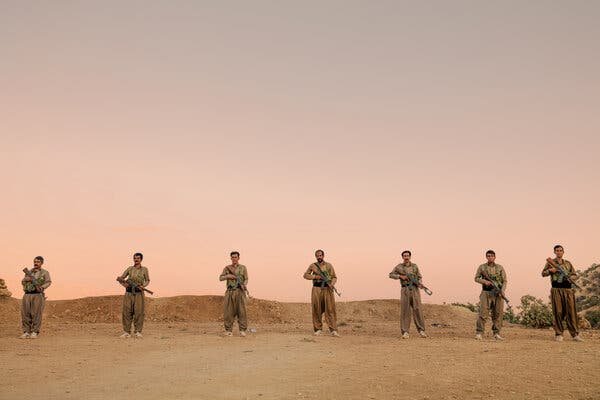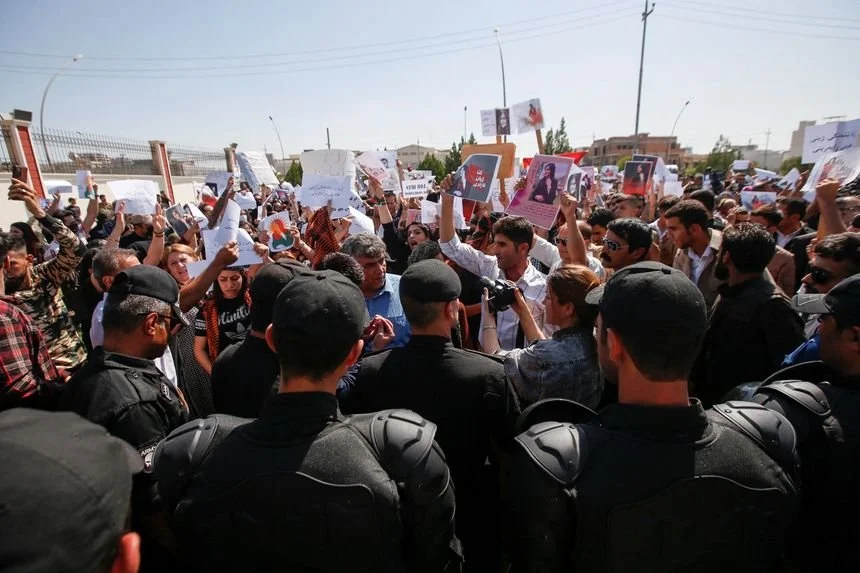Iranian Military Targets Kurdistan Population with Recent Attack in Iraq
Forces of the Kurdish group Komala standing near Sulaimaniya in Iraqi Kurdistan. Photo: Emily Garthwaite/ The New York Times
Iran carried out its latest attack on Kurdish groups in northern Iraq on Nov. 14, killing at least two and wounding ten.
Several Kurdish political parties were targeted in Iraq’s semi-autonomous Kurdistan region when Tehran launched rocket and drone attacks in Sulaimaniya and the region’s capital, Erbil. Two members of the Kurdistan Democratic Party of Iran (KDPI) were killed, and the headquarters of another prominent Kurdish group, Komala, were hit by Iranian forces.
Iraq’s Foreign Minister, Fuad Hussein, denounced the attack as a “hostile escalation” and the Kurdistan Region Prime Minister Masrour Barzani called it a violation of Kurdish and Iraqi sovereignty. Officials in Iran have warned that the attacks will continue if Kurdish opposition fighters are not expelled from the region or disarmed.
Since the outbreak of widespread protests across Iran in September, Iran’s Revolutionary Guard Corps (RGC) has focused its repressive efforts on the country’s Kurdish population. The protests were sparked by the death of a young Kurdish woman, Mahsa Amini, which has exacerbated the existing tensions between the minority group and the Islamic Republic.
Tehran has blamed Western countries for instigating the protests as a tactical move to counter its legitimacy, and Iranian officials have also accused Kurdish groups of organizing the demonstrations. By the end of September, the number of arrests reached 1,000 in Iran’s northwest Kurdish provinces.
Kurds make up half of the country’s political prisoners, despite constituting just 10 percent of Iran’s population.
The RGC previously targeted Iraqi Kurdistan in September, killing 18 people and wounding over 60. In response to criticism over the incursion, Iran’s Foreign Minister Hossein Amir-Abdollahian stated that Iran “responds to unrest, it responds to insecurities decisively and confronts them.”
Local residents claimed that many of the villages hit by drone strikes were not sites for military activity, and even a refugee settlement camp in Koya suffered strikes. The KDPI and Komala have engaged in military conflict with Iranian forces in the past, but the killing of Kurdish civilians marks an escalation of Tehran’s aggression. According to a member of the KDPI, “[Iranian authorities] are trying to divert attention from the protests in Iran, so they’ve resorted to indiscriminate shelling in civilian-populated areas.”
Protestors gathering in September outside the United Nations offices in Erbil, the capital city of Iraqi Kurdistan. Photo: Azad Lashkari / Reuters
Military operations in Iraqi Kurdistan could further provoke tensions between Iran and Iraq. In a phone call with his Iraqi counterpart, Amir-Abdollahian asserted that “the Islamic Republic does not expect to be threatened by the Kurdistan Region of Iraq, and the central government is responsible for these actions.”
Since the fall of Saddam Hussein in 2003, Iran has consistently involved itself in Iraqi politics by funding and training paramilitary groups aligned with various political parties in Iraq. Over 12 political parties in Iraq have ties to Iran, with some even pledging allegiance to Iran’s Supreme Leader Ayatollah Ali Khamenei.
Tehran wants to prevent a hostile government from taking power in Iraq, but its continued meddling in regions like Iraqi Kurdistan has provoked criticism in the past. In 2019, protests erupted in Iraq partly due to Iran’s intervention in the country’s domestic affairs.
One of Tehran’s primary interests in Iraq is eliminating the influence of Kurdish opposition groups based in the north, and it has made clear to Baghdad that Iraqi forces should crack down on groups like the KDPI. Since April, paramilitaries aligned with Iran have been suspected of launching rocket attacks on energy facilities in Iraqi Kurdistan, and in February the Federal Judicial Council in Baghdad invalidated US oil firm contracts in the region.
It is crucial to Iran that it maintains a favorable position in Iraq, a goal that was threatened by the rise of Muqtada al-Sadr in 2019. Al-Sadr opposed U.S and Iranian intervention in Iraq, and his faction formed a political alliance with the Kurdistan Democratic Party (KDP) in 2021. He failed to prevent the election of Iraq’s current Prime Minister, Mohamed Shia Al-Sudani.
Still, Tehran wants to ensure that its ties in Iraq are not jeopardized in the future by politicians like al-Sadr.


